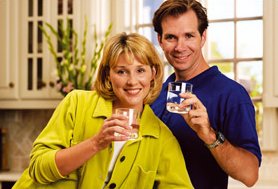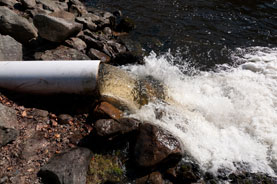ABOUT HEALTH
CLEAN WATER
We are what we drink!
We feel fatigued when the water content of our body drops by 2% and experience significant health problems when it drops by only 9%. The body of an average adult consists of 35-50 litres of water; the brain, heart and muscles contain 75% water; the blood contains 83%; and the lungs 86%.
The air which we breathe has to be fully saturated with water before it enters our lungs. Consequently, we can’t even breathe without water.
A correct, balanced water content is a necessity for each cell’s life functions. The intake of clean (healthy) water is a prerequisite for the optimum functioning of the organism.
To sustain life functions and good health, an adult needs to drink 2 to 3 litres of water each day.
For the bodies to function normally, we need to provide them with a sufficient amount of clean, healthy water. When the amount of water in our bodies is reduced by 2%, we feel exhausted. When it is cut down by 9%, serious health problems occur. If our systems lost 10 to 20% of the water they contain, death would occur.
|

|
Poisoning from drinking water
What kind of water we should drink? In order to protect people’s health, the World Health Organisation (WHO) has made recommendations pertaining to the quality of drinking water. On the basis of these recommendations, every country should not exceed the maximum permitted concentration (MPC) of certain substances in drinking water. A higher concentration of specific substances may seriously affect and endanger our health. Can we be sure that the water we drink on a daily basis is hygienic?
Gasoline, fluorides, pharmaceutical drugs, pesticides, lead, asbestos, nitrates and even radioactive waste - all are dissolved in the water you drink.
Over 800 water-borne impurities have already been identified. It is proven that low-level exposure to many common contaminants has dangerous effects on the humans-including discomfort, sickness, liver or nerve damage, and even cancer!
New health standards are difficult to adopt. Take the case of lead, one of the most common heavy metals found in our drinking water: in 1998 the European Union lowered the maximum permitable level of lead in public potable water from 50 to 10 µg/l.
Because of the high cost and the advanced technology required for the removal of lead from the water, public water providers do not have to comply with the new standard until the year 2013.
Of the hundreds of pollutants in our water, only dozens are closely monitored:
Micro-organisms – Water is a very good breeding ground for micro-organisms.
The microbiological stability of drinking water is one of the most important indicators of its quality, or more correctly, whether it is acceptable from the hygiene and health standpoints.
Water used for drinking, food preparation and personal hygiene must not contain bacteria and viruses because they may cause very dangerous diseases.
Chemical substances can cause dangerous diseases.
Zepter works constantly to deliver products that have an ethical basis in their function - improving your health and your life.
This is Zepter’s mission.
- Arsenic – An increased arsenic presence may cause acute or chronic poisoning. Which leads to changes in the central nervous, digestive and respiratory systems, as well as the skin.
- Lead – Lead poisoning may be caused by the condition of the water-supply pipeline. Lead may cause nerve inflammation, brain disease, anaemia and digestive disorders. Lead remains in tissues, especially in brain tissue, and may cause lasting damage to the nervous system.
- Mercury – The presence of mercury and its compound may lead to serious consequences such as damage to the heart muscle and urinary tract, digestive-tract diseases, skin damage, hair loss, etc.
- Cadmium – Research has shown that cadmium and its compound is carcinogenic. Cadmium is primarily accumulated in the kidneys and has a long half-life period (10 to 35 years).
- Pesticides – More and more often, the pesticides found in refuse, industrial and drainage water as well as in the air reaches a natural body of water.
Research has shown that pesticides are very dangerous to humans, and especially to the central nervous system and liver. Besides, many pesticides are also carcinogenic.
|

|